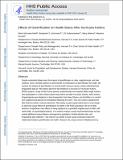| dc.contributor.author | Schnake-Mahl, Alina | |
| dc.contributor.author | Sommers, Benjamin D | |
| dc.contributor.author | Subramanian, SV | |
| dc.contributor.author | Waters, Mary C | |
| dc.contributor.author | Arcaya, Mariana | |
| dc.date.accessioned | 2021-10-27T20:36:23Z | |
| dc.date.available | 2021-10-27T20:36:23Z | |
| dc.date.issued | 2020 | |
| dc.identifier.uri | https://hdl.handle.net/1721.1/136638 | |
| dc.description.abstract | © 2019 Elsevier Ltd Despite substantial debate about the impacts of gentrification on cities, neighborhoods, and their residents, there is limited evidence to demonstrate the implications of gentrification for health. We examine the impacts of gentrification on several health measures using a unique individual-level longitudinal data set. We employ data from the Resilience in Survivors of Hurricane Katrina (RISK) project, a study of low-income parents, predominantly non-Hispanic Black single mothers, who participated in a New Orleans-based study before and after Hurricane Katrina. After Katrina, all participants were displaced, at least temporarily, from New Orleans, and had little or no control over neighborhood placement immediately following the storm. This near-random displacement after Katrina created a natural experiment. We employ a quasi-experimental intent to treat design to assess the causal effects of gentrification on health in the RISK population. We do not find evidence of significant main effects of being displaced to a gentrified neighborhood on BMI, self-rated health, or psychological distress. The analysis employs a quasi-experimental design and has several additional unique features–homogeneous population, limited selection bias, and longitudinal data collection– that improve our ability to draw causal conclusions about the relationship between gentrification and health. However, the unique context of displacement by natural disaster may limit the generalizability of our findings to other circumstances or residents experiencing gentrification. | |
| dc.language.iso | en | |
| dc.publisher | Elsevier BV | |
| dc.relation.isversionof | 10.1016/J.HEALTHPLACE.2019.102237 | |
| dc.rights | Creative Commons Attribution-NonCommercial-NoDerivs License | |
| dc.rights.uri | http://creativecommons.org/licenses/by-nc-nd/4.0/ | |
| dc.source | PMC | |
| dc.title | Effects of gentrification on health status after Hurricane Katrina | |
| dc.type | Article | |
| dc.contributor.department | Massachusetts Institute of Technology. Department of Urban Studies and Planning | |
| dc.relation.journal | Health and Place | |
| dc.eprint.version | Author's final manuscript | |
| dc.type.uri | http://purl.org/eprint/type/JournalArticle | |
| eprint.status | http://purl.org/eprint/status/PeerReviewed | |
| dc.date.updated | 2021-02-03T14:58:00Z | |
| dspace.orderedauthors | Schnake-Mahl, A; Sommers, BD; Subramanian, SV; Waters, MC; Arcaya, M | |
| dspace.date.submission | 2021-02-03T14:58:04Z | |
| mit.journal.volume | 61 | |
| mit.license | PUBLISHER_CC | |
| mit.metadata.status | Authority Work and Publication Information Needed | |
